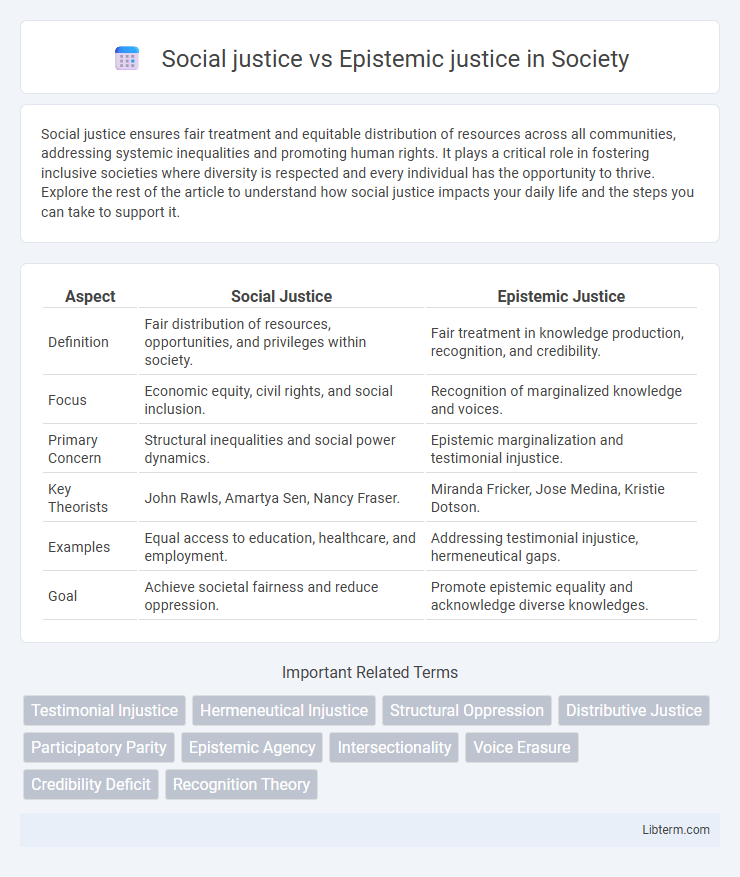Social justice ensures fair treatment and equitable distribution of resources across all communities, addressing systemic inequalities and promoting human rights. It plays a critical role in fostering inclusive societies where diversity is respected and every individual has the opportunity to thrive. Explore the rest of the article to understand how social justice impacts your daily life and the steps you can take to support it.
Table of Comparison
| Aspect | Social Justice | Epistemic Justice |
|---|---|---|
| Definition | Fair distribution of resources, opportunities, and privileges within society. | Fair treatment in knowledge production, recognition, and credibility. |
| Focus | Economic equity, civil rights, and social inclusion. | Recognition of marginalized knowledge and voices. |
| Primary Concern | Structural inequalities and social power dynamics. | Epistemic marginalization and testimonial injustice. |
| Key Theorists | John Rawls, Amartya Sen, Nancy Fraser. | Miranda Fricker, Jose Medina, Kristie Dotson. |
| Examples | Equal access to education, healthcare, and employment. | Addressing testimonial injustice, hermeneutical gaps. |
| Goal | Achieve societal fairness and reduce oppression. | Promote epistemic equality and acknowledge diverse knowledges. |
Understanding Social Justice: Core Principles
Social justice centers on equitable distribution of resources and opportunities to address systemic inequalities faced by marginalized groups. Epistemic justice specifically targets fairness in knowledge production and recognition, ensuring marginalized voices and perspectives are acknowledged and valued. Understanding social justice involves recognizing its core principles: equity, inclusivity, and recognition of diverse social identities to create a just society.
Defining Epistemic Justice: Beyond Knowledge Gaps
Epistemic justice refers to the fair treatment of individuals as knowers, addressing injustices rooted in the validation and recognition of knowledge rather than solely focusing on material inequalities highlighted by social justice. It emphasizes rectifying testimonial and hermeneutical injustices, where marginalized groups' experiences and perspectives are disregarded or misunderstood due to systemic biases. Moving beyond knowledge gaps, epistemic justice demands actively restructuring epistemic systems to ensure inclusivity, credibility, and equitable participation in knowledge production and dissemination.
Historical Roots of Social vs. Epistemic Justice
Social justice emerges from historical efforts to address systemic inequalities in wealth, power, and access within societies, rooted in movements like abolitionism and labor rights activism. Epistemic justice traces its origins to critiques of dominant knowledge systems that marginalize particular groups' experiences, notably influenced by feminist philosophy and critical race theory. Both frameworks seek fairness, with social justice concentrating on material conditions and political rights, while epistemic justice emphasizes recognition and fairness in knowledge production and dissemination.
Power Dynamics in Social and Epistemic Contexts
Power dynamics in social justice revolve around addressing systemic inequalities related to race, gender, and class, aiming to redistribute resources and opportunities for marginalized groups. In epistemic justice, power dynamics concern the recognition and valuation of diverse knowers and ways of knowing, challenging dominant narratives that marginalize certain voices and knowledge systems. Both frameworks critique hierarchical structures, but social justice emphasizes material and institutional power, while epistemic justice centers on cognitive and interpretive authority in knowledge production.
Marginalized Voices: Representation and Recognition
Social justice emphasizes equitable access to resources and opportunities for marginalized communities, highlighting the importance of representation and recognition in social structures. Epistemic justice focuses on addressing the systemic exclusion and misrepresentation of marginalized voices in knowledge production and dissemination. Ensuring marginalized perspectives are both heard and accurately interpreted bridges gaps between social equity and knowledge equity, fostering more inclusive and just societies.
The Impact of Structural Inequalities on Knowledge
Structural inequalities create significant barriers in both social justice and epistemic justice by influencing who has access to knowledge and whose perspectives are valued. Marginalized groups often face systemic exclusion from knowledge production, reinforcing cycles of oppression and limiting diverse epistemologies. Addressing these disparities requires dismantling power structures that privilege dominant narratives and recognizing the importance of inclusive, equitable knowledge systems.
Testimonial Injustice: Whose Voices Are Silenced?
Testimonial injustice occurs when individuals are unfairly discredited as knowers due to biases related to race, gender, or social status, leading to the silencing of marginalized voices within epistemic communities. While social justice broadly addresses systemic inequalities and access to resources, epistemic justice focuses specifically on recognizing and valuing diverse knowledge and experiences in truth-claiming processes. Addressing testimonial injustice requires actively challenging dominant narratives and creating inclusive platforms where historically suppressed perspectives can be heard and trusted.
Educational Systems: Bridging the Justice Divide
Educational systems often emphasize social justice by addressing inequalities in access, resources, and opportunities, yet epistemic justice remains underexplored despite its critical role in validating diverse knowledge systems and voices. Bridging the justice divide requires integrating epistemic justice principles, such as recognizing marginalized students' perspectives and challenging dominant epistemologies that perpetuate exclusion. Implementing inclusive curricula and pedagogies fosters both social and epistemic justice, promoting equity in educational experiences and outcomes.
Promoting Inclusivity: Strategies for Equitable Practices
Promoting inclusivity through social justice involves addressing systemic inequalities and ensuring equal access to resources, rights, and opportunities for marginalized groups. Epistemic justice focuses on recognizing and valuing diverse knowledge systems, combating testimonial and hermeneutical injustice to create fair representation in knowledge production. Strategies for equitable practices include implementing inclusive policies, fostering diverse participation in decision-making processes, and cultivating environments where all voices are heard and respected.
Towards a Holistic Justice Framework: Integration and Future Directions
Social justice emphasizes equitable resource distribution and societal inclusion, while epistemic justice centers on recognizing and valuing diverse knowledge systems and addressing knowledge-based injustices. A holistic justice framework integrates social and epistemic justice to address both material inequalities and cognitive recognition, promoting fairness in social structures and knowledge production. Future directions involve interdisciplinary approaches and policy reforms that simultaneously tackle systemic oppression and marginalized epistemologies for comprehensive justice.
Social justice Infographic

 libterm.com
libterm.com